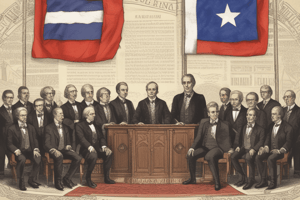Podcast
Questions and Answers
La evidencia, las comparecencias judiciales y la representación legal no son partes integrales de los procedimientos legales.
La evidencia, las comparecencias judiciales y la representación legal no son partes integrales de los procedimientos legales.
False (B)
Las leyes chilenas están en constante evolución para adaptarse a las condiciones sociales y económicas cambiantes.
Las leyes chilenas están en constante evolución para adaptarse a las condiciones sociales y económicas cambiantes.
True (A)
Los mecanismos para impugnar decisiones legales no existen en el sistema legal chileno.
Los mecanismos para impugnar decisiones legales no existen en el sistema legal chileno.
False (B)
La protección del medio ambiente es un tema de debate legal en Chile.
La protección del medio ambiente es un tema de debate legal en Chile.
La implementación de las leyes chilenas no requiere la colaboración de varias agencias gubernamentales.
La implementación de las leyes chilenas no requiere la colaboración de varias agencias gubernamentales.
La Constitución chilena es el nivel más bajo del sistema jurídico.
La Constitución chilena es el nivel más bajo del sistema jurídico.
El congreso chileno es unicameral.
El congreso chileno es unicameral.
El derecho administrativo regula las acciones de las agencias gubernamentales.
El derecho administrativo regula las acciones de las agencias gubernamentales.
El presidente de Chile no tiene responsabilidad en la implementación de leyes.
El presidente de Chile no tiene responsabilidad en la implementación de leyes.
Los procedimientos judiciales en Chile priorizan la equidad en el sistema legal.
Los procedimientos judiciales en Chile priorizan la equidad en el sistema legal.
El derecho comercial se ocupa de los delitos cometidos contra el estado.
El derecho comercial se ocupa de los delitos cometidos contra el estado.
El derecho procesal abarca las reglas que rigen los procedimientos judiciales.
El derecho procesal abarca las reglas que rigen los procedimientos judiciales.
Las enmiendas a la Constitución chilena son simples y no requieren procedimientos complejos.
Las enmiendas a la Constitución chilena son simples y no requieren procedimientos complejos.
Flashcards
Tipos de procesos legales
Tipos de procesos legales
Los procesos legales en Chile se dividen en diferentes tipos, cada uno con sus propios plazos y requisitos.
Evolución de la ley
Evolución de la ley
La ley chilena, como la de la mayoría de las jurisdicciones, está en constante evolución.
Aplicación de la ley
Aplicación de la ley
La aplicación de la ley en Chile involucra a diferentes entidades gubernamentales y organismos de aplicación.
Remedios y mecanismos
Remedios y mecanismos
Signup and view all the flashcards
Integridad del sistema legal
Integridad del sistema legal
Signup and view all the flashcards
La Constitución Chilena
La Constitución Chilena
Signup and view all the flashcards
Derecho Civil
Derecho Civil
Signup and view all the flashcards
Derecho Civil Chileno
Derecho Civil Chileno
Signup and view all the flashcards
El Congreso Chileno
El Congreso Chileno
Signup and view all the flashcards
El Poder Ejecutivo en Chile
El Poder Ejecutivo en Chile
Signup and view all the flashcards
El Poder Judicial Chileno
El Poder Judicial Chileno
Signup and view all the flashcards
El Control de Constitucionalidad
El Control de Constitucionalidad
Signup and view all the flashcards
El Procedimiento Adversarial
El Procedimiento Adversarial
Signup and view all the flashcards
Study Notes
General Overview
- Chilean law is a complex system, shaped by its history and political context.
- It's based on a civil law tradition, heavily influenced by Roman and Spanish legal systems.
- The Chilean legal system relies on a hierarchical structure, with the Constitution at the apex, followed by statutes, decrees, and regulations.
Constitutional Framework
- The Chilean Constitution is supreme law, establishing the fundamental rights and duties of citizens.
- It outlines the structure of government, including the executive, legislative, and judicial branches.
- The constitution guarantees fundamental rights and freedoms, including freedom of speech, religion, and assembly.
- Amendments to the constitution are subject to specific, often complex procedures.
Legal Branches
- Legislative Branch: Congress is bicameral, comprised of the Chamber of Deputies and the Senate.
- It creates laws, enacts budgets, and ratifies treaties.
- Executive Branch: The President of Chile leads the executive branch, responsible for implementing laws and administering government policies.
- Judicial Branch: The Chilean judiciary is structured with various courts, from lower courts to the Supreme Court.
- It interprets laws, resolves legal disputes, and uses judicial review to assess laws against the Constitution.
Key Areas of Law
- Civil law: Covers private matters like contracts, property, family law, and inheritance.
- Commercial law: Deals with business transactions, company formation, and commercial disputes.
- Criminal law: Addresses offenses against the state or society.
- Administrative law: Governs government agencies and institutions.
- Constitutional law: Defines the fundamental principles of the state, including power distribution.
- Procedural law: Outlines court procedures in civil, commercial, and criminal cases.
Legal Procedures
- Legal proceedings in Chile follow established rules and processes, balancing the rights of the accused with justice.
- Adversarial procedures give both sides opportunities to present arguments.
- Evidence, appearances in court, and legal representation are essential elements.
- Different case types have distinct timelines and requirements.
Ongoing Legal Developments
- Chilean law is constantly evolving, adapting to changing social and economic conditions.
- Ongoing legal debate exists around environmental protection, economic inequality, and social reforms, demonstrating a commitment to adapting to challenges.
Enforcement and Implementation
- Enforcing Chilean laws relies on a complex organizational structure involving government agencies and law enforcement bodies.
- The legal system aims for effective and consistent enforcement.
- Mechanisms allow people to challenge decisions and seek redress.
- The system works to ensure public policy integrity and efficacy.
Studying That Suits You
Use AI to generate personalized quizzes and flashcards to suit your learning preferences.




